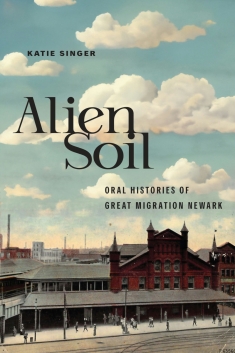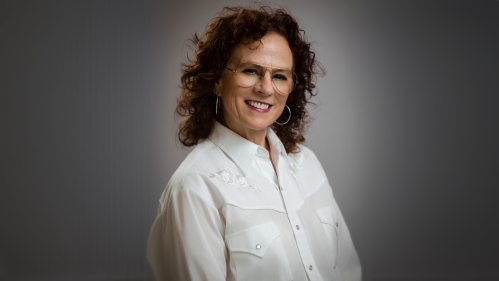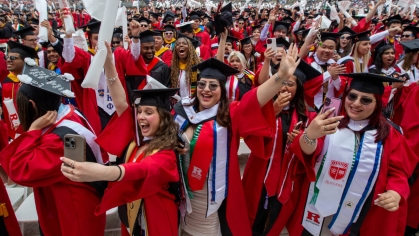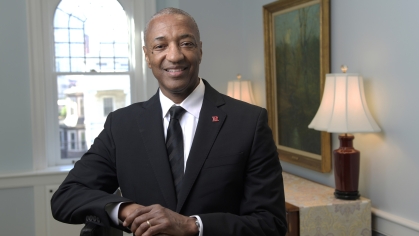Katie Singer’s Alien Soil: Oral Histories of Great Migration Newark offers a unique, long-buried glimpse of the city.
Katie Singer has a great passion for the city where she earned her doctorate and taught for six years.
“Newark has so much history in it, so much African American history,” she says, “which still today often gets pushed into this just-for-February box.”

Singer earned her PhD in American Studies from Rutgers University–Newark in 2017 and based Alien Soil: Oral Histories of Great Migration Newark—which was published by Rutgers University Press in October—on her dissertation work.
Now living in Los Angeles, she will return to speak about her book at the Newark Public Library at 6 p.m. Tuesday, April 8.
Singer’s title is derived from one of the most famous passages in Richard Wright’s memoir Black Boy, which describes the experience of Black people who relocated from the rural South to the industrial North in the middle of the 20th century, a phenomenon known as the Great Migration.
That migration reshaped Newark, altering the city’s social and business landscape, its ways of worship, and more. How it did is a story that Singer heard directly from the migrants, their families, and the new neighbors they acquired when they arrived—in an unexpected way.
Singer’s research and her book sprang from an extracurricular project Singer took on during her studies at Rutgers. She volunteered to be part of a group of graduate students transcribing a series of 107 taped oral histories of Newark residents, recorded in the 1990s. They had either migrated to the city or observed how the city changed as wave after wave of migrants from the South arrived. Those interviewed include former Newark Mayor Sharpe James, the late Newark Municipal Council President Mildred Crump, and Coyt Jones, father of poet and activist Amiri Baraka and grandfather of current Newark Mayor Ras J. Baraka, as well as many congregants of Newark’s Bethany Baptist church.
“To transcribe them, we had to listen to them over and over and over again—and as I did, I fell in love with these voices, these stories,” Singer says.
Those voices, and the stories they told, were almost lost to history. They were initially recorded to become a foundational artifact of a proposed museum of African American history in Newark, which was to be built in the ornate, but long-neglected, Krueger-Scott Mansion on Martin Luther King Boulevard. The interviews were conducted by city residents, often acquaintances of the interviewees, and guided by a questionnaire created by the late Newark historian Clement Price along with his colleague and friend, Giles Wright.
When the effort to create the museum foundered, the tape-recorded oral histories were deposited in the Newark Public Library. Multiple attempts to restore the Krueger-Scott Mansion—named for its two most prominent owners, beer mogul Gottfried Krueger and beauty culture magnate Louise Scott—are the subject of the first chapter in Alien Soil.
The complex history of the building, which was recently restored and reopened as a co-working space, “deserves its own book,” Singer says.
The recordings remained in the library for almost 30 years before a Rutgers–Newark graduate student discovered them (“in a shoebox,” Singer says) and recruited classmates to take on the work of transcribing them. Today, thanks to the Rutgers–Newark Graduate Program in American Studies and the Dana and Alexander Libraries, most of the recordings have been digitized and published online at kruegerscott.libraries.rutgers.edu.
Singer’s book Alien Soil combs through those oral histories to turn up a wealth of detail about life in the city and the Black community here, from the importance of Black churches as a center of social life and a source of aid to Black families in times of crisis, to the difficulties new arrivals from the South had in attempting to integrate into the community, to the vibrant music scene. Almost every interview, Singer says, includes a discussion of the Newark Eagles, the championship professional Negro League baseball team that played in the city in the 1930s and 1940s.
Many interviews also addressed the 1967 rebellion and how it was portrayed in the media. Participants in the interviews speak repeatedly of the fact that Newark was presented as widely and lastingly damaged by the conflict—which was not the case. “All of Newark was not burning, you know that,” one interviewee, Ella Rainey, said.
“And my argument is that . . . this has a lot to do with today, too,” Singer said in a talk in October at Rutgers–Newark John Cotton Dana Library. “Other cities had uprisings too, but they didn’t overshadow the image of the city the way they did in Newark.”
Singer, who was a graduate student and an instructor at Rutgers–Newark, earned her doctorate after first receiving an MFA in creative writing at Fairleigh Dickinson University, where she was instrumental in establishing a minor in African American studies as a part of the curriculum
The Krueger-Scott oral histories speak to many different fields within Singer’s research, from urban studies to African American history. More importantly, they collectively offer a fresh and nuanced look at Newark as a city because it comes directly from those who were present as the city evolved dramatically. Significantly, they offer a range of perspectives from Black Newark residents themselves—whose experiences were often either elided in history books or presented as monolithic.
“There’s a real gap of racial understanding in this country,” Singer says. “I want us all to understand as a country that we’re not all having the same experience here. I want to encourage listening to other people’s stories. It’s so important.”

WE ARE YOU is an ongoing series of stories about the people who embody Rutgers University’s unwavering commitment to academic excellence, building community, and the common good.
Be Part of the Rutgers Story
Discover giving opportunities that support core Rutgers values.
Learn More


